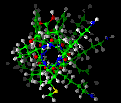 readFile
readFile readFile
readFile Jump to Description or
Examples; explanation of how
commands are documented.
Jump to Description or
Examples; explanation of how
commands are documented.
Keyword Values Default Meaning
filetype molec*ular_system molecular_system Specify the type of file(s) to arc*hive read data from. One of these coord*inate values must be the first or car argument after readFile, since dynamics_restart the filetype is specified by a forcef*ield positional argument. his*tory binary Boolean false Read the binary form of the file. Currently available only for the forcefield filetype (which must be binary). file*name string run_name.extension User-defined name of file. The default is the current run name with the appropriate extension. See below. frame integer 1 For archive and history files, specifies which frame to read. system_name string -- If unspecified, the most- recently read system becomes the current system. If specified, the file is read into a virtual system (with this name), which can later be chosen with the database default command.
 Jump to Syntax or
Examples
Jump to Syntax or
ExamplesThe readFile command reads data from a particular file. If the filename parameter is not specified, the filenames used depend on the filetype parameter and are as follows:
(In the above file types, run_name is your name for the calculation.)
Note--If the filename parameter is given without an extension, the appropriate extension is added.
For the archive and history files, the readFile command returns the value of the energy specified for this frame. This is the total energy of the system when it was written to the file (potential energy for frames generated by minimizations and potential + kinetic energy for frames generated by dynamics). If an attempt is made to read beyond the last frame in the file, an empty string is returned. This can be used to indicate when the end of the file has been reached, as in Example 1. To control the precision of the energy value, the TCL variable tcl_precision may be used.
 Jump to Syntax or
Description
Jump to Syntax or
Description
for {$i = 1} {[set energy [readFile archive frame = $i]] != ""} {incr i} {
puts $file "$i $energy"
...
}
Construct a loop that reads each frame in turn from the archive file
run_name.arc. Print the frame number and energy to $file. The
loop ends when the readFile command returns an empty string for
the energy. This occurs upon reaching the end of the file. Hence it is
not necessary to know a priori how many frames are in the
archive file.
readFile history frame = 2Read the second frame from the history file run_name.his.
readFile molecular_system filename = testRead the coordinate and molecular data files test.mdf and test.car.
readFile forcefield +binary filename = cff91Read the binary forcefield file cff91.xfrc.
readFile car file = test1Read the coordinate file test1.car.
readFile dynamics_restart filename = crn.restart cdlConfig dynamics temperature = 390.0 dynamicsRead the dynamics restart file crn.restart. The default values of dynamics parameters are set to those used by the dynamics run that wrote the crn.restart file. Then change the dynamics temperatures to 390 K for the new dynamics run. The order in which these two commands appear is important--the readFile dynamics_restart command overwrites any previous default parameter values.
 Main
access page
Main
access page  Advanced-Use access
Advanced-Use access  writeFile command.
writeFile command.
 List of BTCL commands
List of BTCL commands
 rattle command
rattle command
 reset command
reset command
Copyright Biosym/MSI